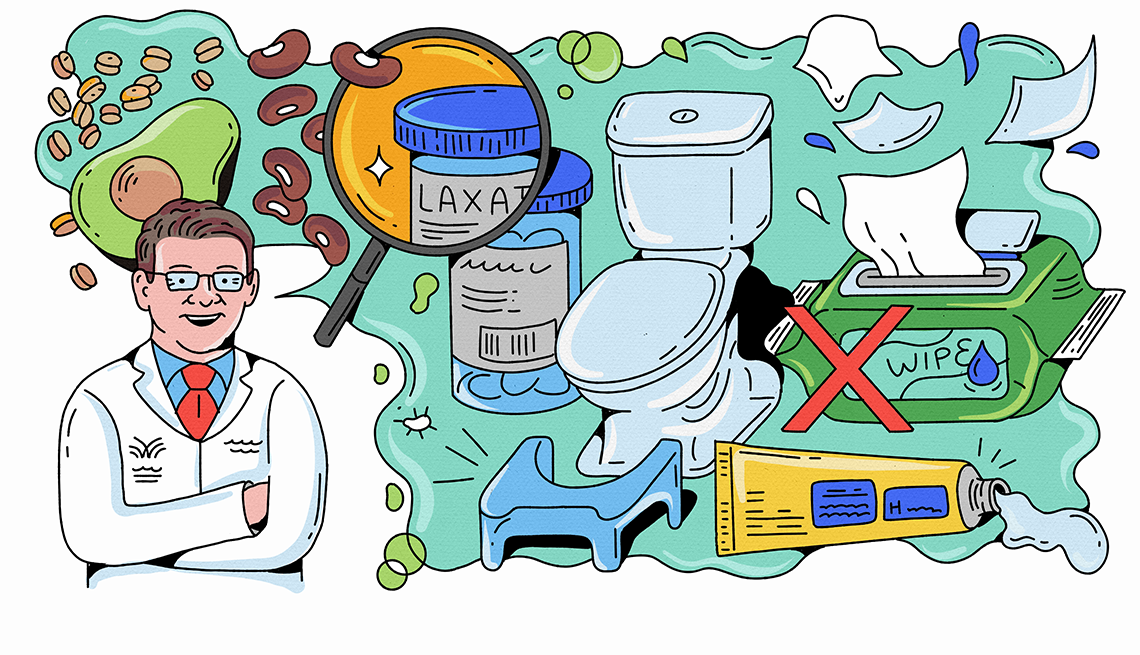AARP Hearing Center


Many older adults are used to talking to their doctors about just about everything. Nothing on our body is off-limits regarding questions about health and longevity. It’s just part of getting older.
But there is one thing that almost everybody has difficulty bringing up. It’s your butt — more medically, your anus. The reality is, anuses weaken and deteriorate with age. Hemorrhoids become more common. Rates of anal cancer are on the rise, especially among older adults. Problems with your anus or rectum are one of the health conditions you shouldn’t be embarrassed about.
Philip Pearson, M.D., is here to help. With two decades of experience, he’s a colorectal surgeon (a more up-to-date term for the same speciality as a proctologist) at Main Line Health in the Philadelphia area and a diplomate of the American Board of Colon and Rectal Surgery. He also runs a popular TikTok account where he discusses health with thousands of followers. There is nothing, literally nothing, he hasn’t been asked about anuses. Here he shares tips — in his own words — with AARP members.
Stop using flushable wet wipes
They might make you feel cleaner than using toilet paper, but “flushable” wet wipes contain chemicals and fragrances that can damage the skin significantly and lead to irritation and inflammation. Also, they can strip away the good bacteria from your anus and the surrounding skin. That’s right — your anus has both good and bad bacteria, and getting rid of both can upset your skin microbiome, leading to redness and discomfort down there. I could show you pictures of the damage done to sensitive skin by these wipes that would make you cringe. (Don’t worry, I won’t!) Wet wipes are also expensive, can clog up your plumbing and are terrible for the environment. Stick with toilet paper or consider investing in a bidet, which can run between $400 and $1,500.
Scrolling can be bad for your butt
Smartphones aren’t the main reason people spend too much time on the toilet. Back in the pre-internet days, people used to read magazines and newspapers on the can. The general rule is that you shouldn’t spend more than 10 minutes sitting on the toilet, and not just because it’s gross. (Researchers at the University of Arizona discovered that most smartphones have 10 times more bacteria than toilet seats.) The longer you’re straining during bowel movements, the higher your risk of developing hemorrhoids. But even if you’re just sitting and scrolling, you're still applying pressure to the veins in your anal area, and that can lead to trouble — not just hemorrhoids but also constipation and rectal prolapse.
Squat your way to happier health
You’ve probably seen those Squatty Potty devices and thought they looked ridiculous. Well, not so fast. You don’t actually need to buy a fancy contraption, but correcting your poop posture can make all the difference. The angle of the hips, rectum and anus while sitting on a Western toilet isn’t quite right. Ideally, your knees should be higher than your hips — a footstool is usually enough to correct this — and you should lean forward and straighten your spine. There was a study a few years ago that showed sitting in a squatting position while defecating causes less strain and more complete bowel movements.
Go ahead and hold it
Whether you’re embarrassed to use a bathroom in public or the options available to you are, well, let’s just say less than sanitary, it makes sense that sometimes you won’t want to take a poop, even if nature is calling. It might be uncomfortable, but it’s almost never a bad thing to “hold” a bowel movement unless it’s a real emergency (and in that case, your body is probably going to do what it needs to do, regardless of whether you want to poop at the airport or not). Just try not to make waiting a regular thing. In rare cases, repeatedly holding in your poop can lead to constipation and even incontinence.






































































You Might Also Like
Insider Secrets from a Top Realtor
Advice for both buyers and sellers on how to have the best success in the housing market
Heart Health Secrets from a Cardiologist
Keep your ticker in great shape as you age
Insider Secrets from a Top Veterinarian
15 tips on giving your pets the best care